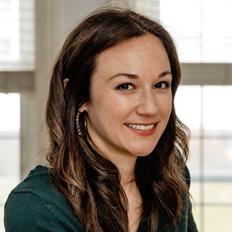
Haley Fernandez 16岁的MSN
护士管理
需要帮助别人
Haley Fernandez '16 was a bed-side nurse after her BSN. She wanted to have a greater influence which motivated her to go through the MSN program at Mount Mercy. She reached her goal and became the Director of Quality and Risk Management at Eastern Iowa Health Center.
是什么让你想成为一名护士?
HF: It sounds cheesy to say that I just wanted to help people, but it’s the truth. Growing up with many family members in the medical field, and a parent in the non-profit human services industry, helping others and giving back was modeled for me at a young age. I have vivid memories of going with my Dad to the homeless shelter on the weekends to volunteer and participating in school and youth group service projects. My senior year in high school, I had a biology teacher, Mr. 为我带来科学生命的Cullinen. I saw nursing as a way to combine my interest in the sciences and human services into a profession and career.
MMU: During your time at Mount Mercy, what was your biggest challenge and how did you solve it?HF: 2015年春天, about halfway through the MSN program at Mount Mercy大学, I lost someone very close to me due to a drug overdose. The opioid epidemic wasn’t as visible then as it is now, and the loss was unexpected and tragic and resulted in a shock that impacted my entire being. There was an outpouring of support from my MMU professors and classmates wanting to know how they could help. 我的教授很有耐心, 种类, and understanding and worked with me to develop an individualized plan to get through my courses. 被真正关心的感觉是显而易见的, and there was no way I would have made it to through the MSN program without the amazing faculty and my fellow MSN cohort of students.
MMU: What inspired you to go further than just the BSN degree? Did something during your time at MMU influence you to go further?"被真正关心的感觉是显而易见的, and there was no way I would have made it to through the MSN program without the amazing faculty and my fellow MSN cohort of students."
HF: I didn’t always know that I wanted to take my education beyond the BSN degree. 在内科外科做过床边护士之后, I was exposed to the various opportunities that nurses have in the healthcare industry, 政府, 教育/学术界, 宣传, 和更多的. I realized that I could have a greater impact in the field by furthering my degree.
跟我们说说你的工作吧? 你的具体工作职责是什么? Could you walk us through a day and tell us why you decided to go that way?HF: I work as the Director of Quality and Risk Management at Eastern Iowa Health Center (EIHC). EIHC is a non-profit federally qualified health center with 3 locations serving Linn County and the surrounding areas for Family Medicine, 儿科, 行为健康, 妇产医院, 和牙科. We believe in health equity for all and accept anyone and everyone, regardless of their insurance status or ability to pay.
作为领导团队的一员, my day to day work typically includes meetings with chief executives to discuss strategy, 解决问题, 组织决策. A good part of my day is also spent leading process improvement projects, 制定和实施循证政策, 确保安全和法规遵从性, 健康信息学优化和数据分析. I also manage a small but mighty team involved in daily operations and patient services. I gain great fulfillment and joy from my job because of the impact I can have on the system in which we deliver care and because of the variety of projects that I get to be involved it.
总是乐于学习和成长
MMU: Would you advise current students to go further than just the BSN? 你对在读学生有什么建议吗?
HF: 获得BSN是一项伟大的成就. To those thinking about continuing their education in nursing, but maybe thinking “is it worth it?或者“我能从中得到什么??,我的建议是 就跳! We should always be learning, growing and the investment of time and money in yourself is worth it. Furthering your degree will only open doors of possibility.
“我的建议是跳下去!"
MMU: How did the BSN and MSN degree prepare you for your career?
HF: The MSN program provided a strong focus in writing, 研究, and presenting skills that have served me well in my current role. 不仅仅是硬技能, the MSN provided me the knowledge and confidence in soft skills like developing professional relationships, 职业道德, 以及决策. As one rises higher in an organization to a leadership role, 软技能包括团队合作, 沟通, 以及激发和影响变革的能力, 好的领导者和伟大的领导者有什么区别. As the healthcare landscape continues to evolve at a rapid rate, I believe soft skills are even more important for nurse leaders to have a voice in impacting the healthcare delivery system.
MMU: What was the most important take away from your time at Mount Mercy?
HF: Hands down it’s the relationships that I was able to build with the faculty of MMU and with my fellow MSN cohort. 我仍然期待博士. Sharon Guthrie as a mentor and friend as I continue to develop as a nurse leader. Our graduating MSN cohort has an active Facebook page where we share job postings, 关于护理的有趣文章, 以及职业发展机会. I’ve been able to attend some MMU MSN alumni gatherings, which are a bunch of fun and also great networking events.
MMU: During your time in the MSN program, how did you handle stress?
HF: Working 100% as a med-surg nurse while going through the MSN program was stressful. I´m not the type of person that performs well with procrastination and subsequent self-inflicted tight deadlines, 所以提前计划对我来说非常重要. 如果我不确定从哪里开始, I would make a list an prioritize what I needed to do, 就像护士给病人分诊一样. I also made sure to schedule in some time off to relax, practice self-care, 享受和朋友在一起的时光.